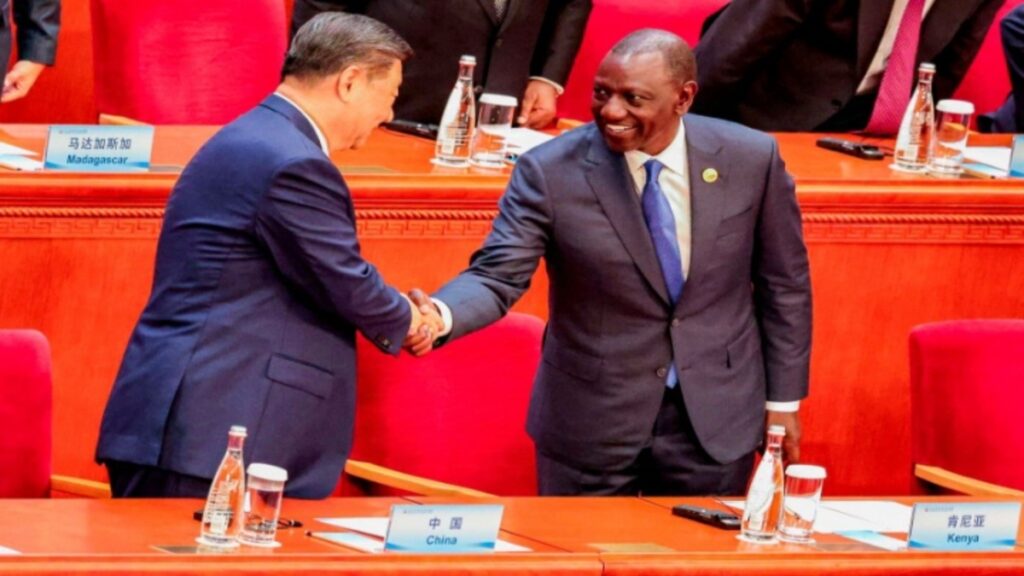In a significant move to bolster its economic development, Kenya is actively seeking support from China for investments in renewable energy and affordable housing. This initiative comes at a time when the East African nation is striving to enhance its infrastructure and improve the living standards of its citizens. The collaboration is expected to bring in much-needed financial resources and technological expertise, paving the way for sustainable growth.
The key players in this initiative are the Kenyan government, led by President William Ruto, and various Chinese stakeholders, including state-owned enterprises and private investors. The Kenyan government has identified renewable energy and affordable housing as priority sectors for development. President Ruto has been vocal about his administration’s commitment to transforming Kenya into a middle-income economy by 2030. He believes that partnership with China can significantly accelerate this vision.

President William Ruto discusses investment opportunities with Chinese business leaders, aiming to strengthen Kenya-China relations in renewable energy and housing/photo courtesy/
The initiative focuses on two main areas: renewable energy and affordable housing. Kenya has abundant renewable energy resources, particularly in geothermal, wind, and solar power. However, the country faces challenges in harnessing these resources effectively due to financial constraints and technological gaps. By partnering with China, Kenya aims to attract investments that will facilitate the development of renewable energy projects, which are crucial for achieving energy security and reducing reliance on fossil fuels.
In addition to energy projects, the collaboration also targets the housing sector. Kenya faces a significant housing deficit, with millions of citizens lacking access to affordable housing. The government aims to construct low-cost housing units that meet the needs of low- and middle-income families. Chinese construction firms are expected to play a pivotal role in this endeavour, bringing their expertise in large-scale infrastructure projects.
The investments will primarily focus on various regions across Kenya, particularly those that are underserved in terms of infrastructure and basic services. Areas such as Nairobi, Mombasa, and Kisumu are likely to be at the forefront of these developments due to their strategic importance and growing populations. The government has identified specific sites for renewable energy projects, including wind farms along the coast and geothermal plants in the Rift Valley.
Furthermore, urban areas will be targeted for affordable housing projects. The Kenyan government aims to create sustainable communities that provide residents with access to essential services such as schools, healthcare facilities, and transportation networks. By focusing on these regions, the partnership seeks to address both energy needs and housing shortages simultaneously.
The collaboration between Kenya and China is set to commence shortly after formal agreements are finalised. Discussions have already begun, with both parties expressing optimism about the potential outcomes. President Ruto’s administration is keen on expediting the process to ensure that projects can start within the next year. The urgency is driven by the pressing need for sustainable solutions to Kenya’s energy crisis and housing challenges.
Moreover, as global attention shifts towards climate change and sustainable development goals (SDGs), this partnership aligns with international efforts to promote green energy initiatives. The timeline for project implementation will depend on various factors, including regulatory approvals and funding arrangements.
This partnership is crucial for several reasons. Firstly, it addresses Kenya’s urgent need for reliable energy sources. With a growing population and increasing demand for electricity, investing in renewable energy is essential for ensuring that all citizens have access to power while contributing to environmental sustainability.
Secondly, the collaboration aims to alleviate the housing crisis that has plagued Kenya for years. By providing affordable housing options, the government can improve living conditions for many families who currently reside in informal settlements.
Finally, this initiative strengthens diplomatic relations between Kenya and China. As both countries continue to deepen their economic ties, this partnership serves as a model for future collaborations in other sectors such as agriculture, technology, and education.
In conclusion, Kenya’s pursuit of Chinese support for investments in renewable energy and affordable housing marks a pivotal moment in its development trajectory. With strategic planning and effective execution, this partnership has the potential to transform not only the energy landscape but also the lives of millions of Kenyans seeking better living conditions. As discussions progress towards actionable agreements, both nations stand poised to embark on a journey towards sustainable growth and mutual benefit.